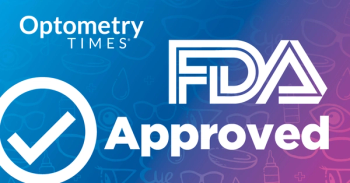
- Digital edition: January 2022
- Volume 14
- Issue 01
Mitigate diabetic retinopathy with early improved glucose control
Timing is key in reducing the risk of developing vision loss or blindness.
A medical truism has arisen that lower blood glucose levels translate into less incidence and progression of diabetic retinopathy (DR), the leading cause of severe vision loss and new-onset blindness in working-age Americans.
Large, prospective trials of both type 1 diabetes (Diabetes Control and Complications Trial [DCCT], Epidemiology of Diabetes Interventions and Complications and Stockholm Diabetes Intervention Study) and type 2 diabetes (United Kingdom Prospective Diabetes Study [UKPDS], Veterans Association Diabetes Trial, and ACCORD-Eye) show that lower blood glucose levels, as reflected by glycosylated hemoglobin A1C (HbA1c), do reduce the risk of developing DR and worsening DR compared with higher blood glucose levels.1,2
Previously by Dr. Chous:
So does that mean reducing blood glucose always mitigates progression of preexisting retinal disease and, ultimately, reduces the risk of vision-threatening complications (VTCs) such as ocular neovascularization (optic nerve, retina and/or anterior segment) and diabetic macular edema (DME), the principal drivers of vision loss in diabetes?
Metabolic memory
The same prospective studies mentioned above revealed another curious phenomenon, often called metabolic memory.3
That is, patients who achieve good, early, stable blood glucose control soon after diagnosis of their diabetes were significantly less likely to develop DR or severe DR over decades of follow-up than those who did not achieve such control, despite worsening glycemic control over time in the former group (positive metabolic memory).
Conversely, patients who had poor glucose control in the first 5 to 10 years post diagnosis were significantly more likely to develop DR and severe DR despite achieving much better control in subsequent years (negative metabolic memory).
Related:
The mechanisms underlying metabolic memory are complex but are thought to involve irreversible damage to mitochondrial DNA as well as epigenetic (without alteration in DNA sequence) changes to mitochondrial enzymes responsible for glucose homeostasis and energy production.4
HbA1c in PANORAMA
Relevant to the concept of metabolic memory is the relative benefit of achieving excellent blood glucose control in those who have already developed more severe DR.
The PANORAMA trial which assessed the efficacy of intravitreal aflibercept versus placebo injections in patients with moderately severe or severe nonproliferative diabetic retinopathy (NPDR) without DME gives us an opportunity to see if participants with more advanced retinopathy were protected from progression to VTC by virtue of better glucose control (again, assessed by HbA1c) at study entrance.
Related:
Aflibercept was shown to significantly increase the odds of a 2-step regression (improvement) in DR severity (eg, a patient with severe NPDR at baseline regresses to only moderate NPDR after 50 or 100 weeks) and, more importantly, reduced the odds of any VTC by up to 80% in the treated versus placebo groups.5
Remember, it is these VTCs—proliferative diabetic retinopathy, iris or angle neovascularization, and/or center-involved diabetic macular edema—that are responsible for marked vision loss and blindness in diabetes.
Analysis
Further analysis of factors that might modulate DR regression or development of VTC, principally patient age, body mass index, and HbA1c at baseline, showed that aflibercept was equally effective/protective in patients across the spectrum of these variables.
Put more plainly and for the purposes of my argument, the anti-VEGF agent worked equally well whether patients had good or bad glucose control at the beginning of the study.
Conversely, participants who progressed to a VTC were not protected by good blood glucose control at study entrance and, in fact, were more likely to have a lower HbA1c value (Table).
I was permitted a more granular look at HbA1c data for multiple participants in PANORAMA and was struck by how many patients with clinically excellent glycosylated hemoglobin levels, in the low 6s at baseline, still progressed to a VTC over the course of the trial.
Although long-term blood glucose data for participants have not been analyzed as part of PANORAMA to date, all outcomes are entirely consistent with the concept and biology of metabolic memory.
We know that many patients do not achieve excellent diabetes control within the first few years after receiving a diagnosis, and many improve their control only after intensification of diabetes therapy, referral to endocrinology, becoming fearful after diagnosis of any diabetes complications, and gaining the sagacity of older age.
Of critical importance, this means that physicians need to help their patients strive for rapid normalization of blood glucose levels after a diabetes diagnosis is received. It also means that eye doctors should not base their follow-up, referral, or treatment decisions for patients with more severe DR on current glycemic control but, rather, on their disease severity.
Good and consistent diabetes control does mitigate onset and progression of early DR, but once the horse is out of the barn, improved blood sugar control is simply no longer protective.
Read more
References
1. Aiello LP, Cahill MT, Wong JS. Systemic considerations in the management of diabetic retinopathy. Am J Ophthalmol. 2001;132(5):760-776. doi:10.1016/s0002-9394(01)01124-2
2. Rodriguez-Fontal M, Kerrison JB, Alfaro DV, Jablon EP. Metabolic control and diabetic retinopathy. Curr Diabetes Rev. 2009;5(1):3-7. doi:10.2174/157339909787314176
3. Zhang L, Chen B, Tang L. Metabolic memory: mechanisms and implications for diabetic retinopathy. Diabetes Res Clin Pract. 2012;96(3):286-293. doi:10.1016/j.diabres.2011.12.006
4. Kowluru RA. Diabetic retinopathy, metabolic memory and epigenetic modifications. Vision Res. 2017;139:30-38. doi:10.1016/j.visres.2017.02.011
5. Brown DM, Wykoff CC, Boyer D, et al. Evaluation of intravitreal aflibercept for the treatment of severe nonproliferative diabetic retinopathy: results from the PANORAMA randomized clinical trial. JAMA Ophthalmol. 2021;139(9):946-955. doi:10.1001/jamaophthalmol.2021.2809
Articles in this issue
almost 4 years ago
Quiz: Postoperative carealmost 4 years ago
A narrative guide for cataract postoperative surgical carealmost 4 years ago
Incorporating injections into your practicealmost 4 years ago
The safety and efficacy of mass-produced colored contact lensesalmost 4 years ago
Cryopreserved amniotic membrane excels at healing ocular surface woundsalmost 4 years ago
Case study: persistent keratitis OS presents in 68-year-old womanNewsletter
Want more insights like this? Subscribe to Optometry Times and get clinical pearls and practice tips delivered straight to your inbox.








































